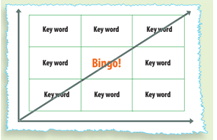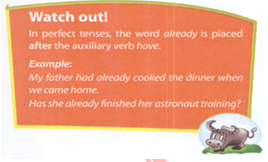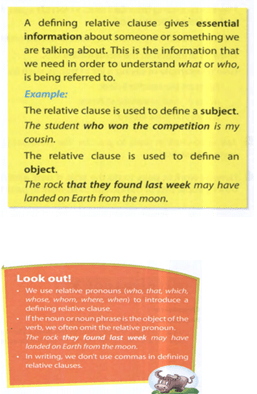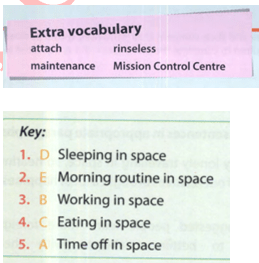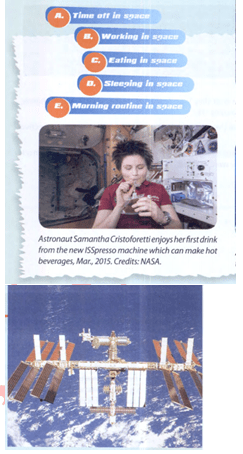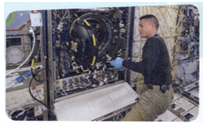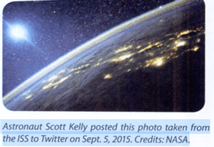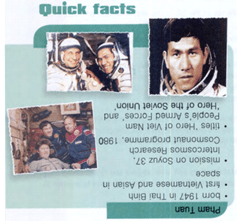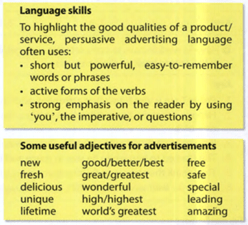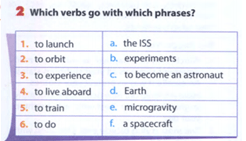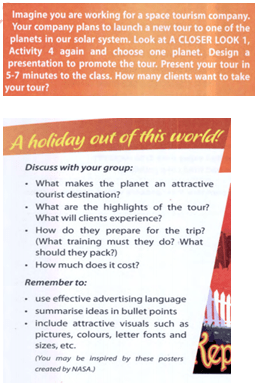|
Unit 10:SPACE TRAVEL Lesson 1 - GETTING STARTED:A mission to Mars |
I. OBJECTIVES:By the end of this Unit, students will be able to:
·Use some vocabularies and structures to talk about space travel
II . PREPARATION:sub -board, pictures, cassette
III. PROCEDURES:
|
Teacher’s and students’ activities |
Content |
|
Introduction Before starting this lesson, do a quick game to revise the main grammar point in Unit 9: relative pronouns. Write on the board some phrases that will need relative clauses to be complete, for example: The language... This is the place... I met the girl... In groups of three, Ss take turns to complete these sentences: thefirst student says one of these phrases, then the second student adds a relative pronoun. The last student will add a clause tofinish the sentence. For example: Student 1: The language... Student 2: ...which... Student 3: ...I would like to learn the most is Spanish. Before Ss start reading the GETTING STARTED conversation, introduce the characters Phuc and Nick and provide the context: Nick is visiting Phuc, and they are now talking in Phuc’s room. Ask Ss to focus on the picture and the heading ‘A mission to Mars’. Ask questions: What do you think Phuc and Nick are talking about? What else can you see in the room? What do you think Phuc is interested in? Why do you think so? Do not provide corrective feedback at this stage. Now play the recording. Ask the class to revise their answers if necessary. Activity 1: a/Now tell Ss to look at the text of the conversation. Play the recording and have Ss follow along. Have Ss then work in pairs to do the matching exercise. b/Have Ss continue to work in pairs and answer the questions. Give feedback as a class. Ask Ss to say where in the conversation they found the answers to the questions. c/Have Ss discuss the questions: ‘Who is keener on space travel – Phuc or Nick? Why do you think so?’ Ask Ss to give as much information in the text to support their answers as possible. Activity 2: Have Ss work individually for this exercise. Ask them to pay attention to the photos and the key words/ content words in the sentences. Have Ss then compare their answers with a partner. Activity 3: Ask Ss to work in small groups for this game. Give Ss the following instructions. T may draw a bingo card on the board and fill in the first word as a demonstration. • First, create a Bingo card of nine squares by drawing two horizontal lines and two vertical lines. Write ‘Bingo!’ in the middle square to form a ‘free space’. • Second, create a vocabulary list that contains eight new words that Ss have learnt in this lesson. • Third, each player fills in his or her Bingo card with the words from the list. Each player should have his or her words indifferent squares for the game to work. • Write the eight vocabulary words on small pieces of paper, shuffle the paper, and keep them face down. Then, one person turns over the pieces of paper one by one, and calls out either the actual words or the definitions. (See the illustration beside.) • Players find the words in their grid as they are called, and mark them off. When a player has marked three boxes down, across, or diagonally (counting the ‘free space’), he or she calls out ‘Bingo!’ and wins the round. Ss can play several rounds with the same card. Use a different symbol to mark the card for each round. |
a/ Key: 1. d 2. e 3. f 4. c 5. b 6. a b/ Key: 1. Phuc was crazy about space. 2. He had learnt about the universe and had collected lots of books about space. 3. To show that there are more things in the list but that it’s not necessary to list everything. 4. He wasn’t very impressed because he thought the meteorite was like an ordinary piece of rock. 5. By scuba diving in a flight suit and by taking a parabolic flight to experience microgravity. 6. He compares it to a ride on a rollercoaster. c/ Key: Phuc seems keener on space travel than Nick. He was crazy about space when he was young. Phuc knows more about space and astronauts. He says he’d love to experience microgravity, whereas Nick thinks microgravity sounds scary. Activity 2: Key: 1. satellite 2. telescope 3. universe 4. meteorite 5. rocket 6. spacecraft Activity 3:
|
IV- HOMEWORK:
-Practice reading the dialogue.
-Write new words then learn them by heart.
-Copy the exercise into notebooks.
-Prepare A CLOSER LOOK 1
_________________________________
|
Unit 10:SPACE TRAVEL Lesson 2 – A CLOSER LOOK 1 |
I. OBJECTIVES:By the end of this Unit, students will be able to:
·use the lexical items related to astronomy and space travel
·identify continuing orfinishing tones and say sentences with the correct intonation
II . PREPARATION:sub -board, pictures, cassette
III. PROCEDURES:
|
Teacher’s and students’ activities |
Content |
|
Vocabulary Activity 1: Have Ss work individually to complete the exercise. Remind them to modify the verbs where necessary. They then compare their answers in pairs. For a more able class, after Ss have finished, ask them which word(s) can be used as a noun as well. Give feedback: orbit, experience, launch. Ask Ss to make sentences with these nouns. Activity 2: For this exercise, remind Ss of some words about space they have learnt earlier, for example: astronaut, jet pilot, weightlessness, water tank laboratory, microgravity. Then have Ss work individually to complete the exercise. Ask Ss to pay attention to the key words to understand the text, as well as to the part of speech of the missing words. Activity 3: a/ As a class, ask Ss to cover the boxes on the right so that they can attempt to guess the meaning of the idiomsfirst. Then they uncover the boxes and do the matching exercise. Check the answers as a class, and make sure the idioms are understood before moving on to b/ Have Ss then work in pairs to make short dialogues using the idioms they have learnt. Activity 4: This game can be played in small groups in two rounds. In therst round, all groups will read the de nitions to guess the planets. The game will be timed. The group who is quickest to have all correct answers is the winner. If time allows, have Ss play the second round. In this round, T writes the names of some of the planets on the board (one by one). In 30 seconds, each group has to write on a piece of paper one fact they know about these planets, without looking at the textbook. The papers will then be cross checked by groups to find the group which has the most correct answers. Pronunciation Continuing orfinishing tones Play the recording from GETTING STARTED again, focussing on the part where Phuc tells Nick about what he had learnt about space. ‘I’d learnt about the planets, the stars, satellites, rockets, and stuff.’ Draw Ss’ attention to the REMEMBER! box. Give an example of saying a list of things, such as: -items on the teacher’s desk -items in your wardrobe at home -places you have visited Activity 5: Ask Ss to work in pairs to practise saying the statements and short dialogues. Play the recording and have Ss check their pronunciation. Activity 6: Have Ss work in pairs to do the task. If time allows, ask them to think of other situations when they tell other people lists of things. Ask Ss to work in pairs to play out the situations. |
Activity 1: Key: 1. orbit 2. experienced 3. launched 4. landed 5. trained Activity 2: Key: 1. good health 2. aflight suit 3. parabolicflights 4. operate 5. spacewalks Activity 3: Key: 1. c 2. a 3. d 4. b Activity 4: Key: 1. Venus 2. Mercury 3. Jupiter 4. Mars 5. Neptune 6. Earth 7. Saturn 8. Uranus |
IV- HOMEWORK:
-Write new words then learn them by heart.
-Copy the exercise into notebooks.
-Prepare A CLOSER LOOK 2
************************************************************
|
Unit 10:SPACE TRAVEL Lesson 3 -A CLOSER LOOK 2 |
I. OBJECTIVES:By the end of this Unit, students will be able to:
·Use Past simple and past perfect correctly with confidence
·Use defining relative clauses correctly and appropriately
II . PREPARATION:sub -board, pictures, cassette
III. PROCEDURES:
|
Teacher’s and students’ activities |
Content |
|
Grammar Past simple & past perfect: review Ask Ss to study the timeline to familiarise themselves with the events and when they happened. T can read out any two of the events on the timeline, and ask Ss which event happened first. Vocabulary Activity 1: 1 Remind Ss of how to use the past simple and past perfect. Have Ss then work individually to complete the exercise. Tell Ss to pay attention to the position of already in the sentences. Activity 2: Ask Ss to complete the box with T’s year of birth and their own year of birth. Then ask Ss to check where the dates fit into the timeline. Ss can write out the dates and events from the timeline along a line drawn on a piece of paper. They can then add in this task four additional dates. Have Ss now work in pairs to talk about these events. Remind them to use the word already. Walk around the class and provide help if necessary. Call on some pairs to give their questions and answers in front of the class. Defining relative clauses Activity 3: - Draw Ss’ attention to the grammar box and Look out! box. Give more examples if necessary. Ensure Ss have understood the rules before moving on. Have Ss work individually to complete the exercise and then compare their answers with a partner. Remind Ss that a relative pronoun may not be required to complete the sentences (indicated in the key with a cross). Activity 4: - Have Ss work individually to complete the exercise and then compare their sentences with a partner. Remind Ss that a relative pronoun may not be required to complete the sentences – this is indicated in the key with a cross (x). Activity 5: - This activity can be done as pair work or a game between two big groups. One student or group describes the object/person/event using defining clauses for the other student or group to guess. |
Activity 1: Key: 1. had been sent; made 2. became; had (already) been launched 3. hadown; walked 4. put; had (already) sent 5. was established; had (already) travelled
Activity 3: Key: 1. who/that 2. where 3. which/that/x 4. which/that 5. which/that/ x 6. when Key: 1. The film which/that/x the class watched yesterday was about the Apollo 13 space mission. 2. We read about an astronaut who travelled into space in 1961. 3. This is the man who works for NASA. 4. The team who/that plays on the left has never won the championship. 5. The ground-breaking space mission which/that/x this article describes is called Rosetta. 6. The task which/that/x the Rosetta mission has is comparable to a fly trying to land on a speeding bullet. |
IV- HOMEWORK:
-Write new words then learn them by heart.
-Copy the exercise into notebooks.
-Prepare COMMUNICATION
_______________________________
|
Unit 10:SPACE TRAVEL Lesson 4 -COMMUNICATION |
I. OBJECTIVES:By the end of this Unit, students will be able to:
·talk about space travel history and life on a space station
II . PREPARATION:sub -board, pictures, cassette
III. PROCEDURES:
|
Teacher’s and students’ activities |
Content |
|
Activity 1: -Ask Ss to work in pairs to complete the exercise after they have looked at the pictures (taking a shower, sleeping in a sleeping bag, listening to music, pouring salt). Accept all answers from Ss and remember to ask them to explain their decisions. Do not give corrective feedback at this point. Now ask Ss to read the text. Tell them to pay special attention to any information that helps them to check their earlier answers. Tell them to notice any new words as well. Now give correction. Activity 2: Have Ss work individually and then in pairs for this task. - After Ss have finished, ask them to study the three photos of the 155 in the textbook and connect these photos with the information in the text. If time allows, T may provide some of the latest photos and blog posts produced by astronauts who are living aboard the ISS They are available atWWW.blog.nasa.gov. Now ask Ss to come back to the question list which has been created earlier on the board and try to answer them with the information from this lesson. If there are some questions that cannot be answered with the text, encourage Ss to find more about them by themselves (using the Internet, books, etc.). T may provide the NASA blog URL above as an additional resource. Activity 3: This activity can be organised as a debate. Have Ss work in small groups and agree on the three items they will bring to the ISS for each need in 2 . When all groups are ready with their list, the class gets together and decides on a new three-item list. Each group has to persuade the others that their items should be on this list, rather than those of the other groups. Activity 4: Have Ss work individually and write down a personal thing they will take aboard the ISS because they cannot live without it. Then ask Ss to work in pairs to share what they have written. Ss need to explain to their partner why this item is so important to them. |
Key: 1. O 2 . X 3 . X 4. O
NASA astronaut Kjell Lindgren replaces items inside the ISS, Sep., 2015. Credits: NASA.
Astronaut Scott Kelly posted this photo taken from the ISS to Twitter on Sept. 5, 2015. Credits: NASA.
|
IV- HOMEWORK:
-Write new words then learn them by heart.
-Copy the exercise into notebooks.
-Prepare SKILLS 1
______________________________
|
Unit 10:SPACE TRAVEL Lesson 1 -SKILLS 1 |
I. OBJECTIVES:By the end of this Unit, students will be able to:
·read for specific information about two famous astronauts' space travel
·talk about space travel history and life on a space station
II . PREPARATION:sub -board, pictures, cassette
III. PROCEDURES:
|
Teacher’s and students’ activities |
Content |
|
Activity 1: -Have Ss work in pairs. Ask Ss to focus on the photos and try identifying the Vietnamese astronaut (Pham Tuan). Ask if they know anything about Pham Tuan. Pairs can share what they already know about Pham Tuan. After that, have Ss turn the page upside down and read the Quick facts box, then they tell each other some more information about Pham Tuan in full sentences. Activity 2: a/Explain to Ss they are going to read a text about two famous astronauts talking about their space travel experience. Ask Ss to guess what they think the two astronauts will talk about. T may refer back to the information about the ISS that Ss have learnt about in COMMUNICATION. Have Ss then read the text and do the exercise individually. Discuss the answers with the class but remember to ask Ss to explain their decisions. (Why do you think this quote should go in this paragraph?) b/ Have Ss work in pairs to complete the exercise. When giving feedback, ask Ss to give further information in the text to back up their answers. Speaking Activity 3: -3 Have Ss work in pairs for this task to discuss the qualities and skills. First, ask Ss to look at the reading text in 2 again and try to extract the necessary characteristics/qualities/skills for astronauts from the things Pham Tuan and Christer Fuglesang said. For example: a love for nature, can eat packaged food for a long time, etc. Then tell Ss they can look at A CLOSER LOOK 1, Activity 2, as well as COMMUNICATION, for more ideas. Pairs get together to exchange their ideas. Then as a class, Ss build up a list of qualities and skills needed to be an astronaut. Activity 4: 4 Have Ss work in groups for this role play and solve the problems. There are no wrong answers here. Encourage Ss to be creative with their ideas. Once Ss have finished, each group may present their decisions and the class chooses the best solutions. |
Key: 1. c 2. a 3. b Key: 1. Pham Tuan is Viet Nam's first astronaut, and Christer Fuglesang is Sweden's first astronaut. 2. He found that the Earth didn't look as big as he thought, and he thought we should cooperate to take care of it. 3. It seemed he didn't enjoy it much since it wasn't fresh. 4. They talked to him when he was in space and that made him happy. 5. They think the chance to fly into space is equal for everyone. 6. He thinks teamwork, social skills, and language skills are important for an astronaut. Key (suggested): • One crew member feels extremely homesick: She/ He can make phone calls to family and friends on Earth. She/.He can exercise, read a book, listen to music, or play some games. Other crew members can talk to her/him, or together they can do something fun in their free time, for example having a ' space party'. • When looking at the monitoring system you discover a strange object approaching Earth: The crew can contact the Mission Control Centre for help. They can start watching the object, record its movements, and report back to Earth. |
IV- HOMEWORK:
-Write new words then learn them by heart.
-Copy the exercise into notebooks.
-Prepare SKILLS 2
************************************************************
|
Unit 10:SPACE TRAVEL Lesson 1 – SKILLS 2 |
I. OBJECTIVES:By the end of this Unit, students will be able to:
·Listen for general and specific information about some space tourism services
·write a short paragraph using advertising language
II . PREPARATION:sub -board, pictures, cassette
III. PROCEDURES:
|
Teacher’s and students’ activities |
Content |
|
Activity 1: -Draw Ss' attention to the pictures. Elicit what they find interesting about them (a person relaxing on a planet in a spacesuit, people pulling suitcases for holidays in the universe, etc.) For a more able class, T may ask if Ss know anything about space tourism. Ss then may have a discussion as a class about what kind of services they think might be offered. Activity 2: -Have Ss read the questions first. Remind them that they can only write no more than three words to answer the questions. Allow Ss to listen to the recording several times and give them plenty of time to complete this task. Activity 3: -Before playing the recording again, challenge Ss to match the numbers to their references with what they remember from the last listening. Then Ss listen to either check or complete the task. WRITING: Persuasive language for advertisements -Activity 4: Explain that advertisements are written in a special way to persuade customers to buy or use a product or service. Have Ss analyse the first advertisement and underline the words or phrases that make it sound more persuasive. Then ask Ss to work in pairs to analyse the last two advertisements. If time allows, T may bring in other print advertisements or TV commercials (in English or Vietnamese) for the analysis. After Ss have completed the task, introduce the Language skills box. For a more able class, ask Ss to add more adjectives that they think may be used in advertisements. Activity 5: - Ask Ss to look out for hints in the words used when doing this task. For example, 'shine' may go with ' shampoo', 'bar' with 'chocolate', etc. Once Ss have finished, ask them to pay attention to the way the advertisements are written. Do they use any of the advertising techniques they have learnt so far? T may ask Ss to discuss which advertisements they like the most, and why. Activity 6: This task can be done as a group writing task. Ss may work in small groups of three or four to decide together what their advertisements will be like. Remind Ss to select advertising techniques they have learnt (strong adjectives, active verbs, imperatives, comparatives, questions, etc.) for their text. Then have Ss work individually to write their advertisements. |
Key: The recording is about space tourism. Activity 2: Key: 1 recreational, leisure, business 2. International Space Station 3. 'Spacewalk' 4. 'manned spaceflight' 5. costly, dangerous, unsustainable Activity 3: Key: 1. D 2 C 3. A 4. E 5. B Audio script: Dreaming of a holiday sunbathing on Mars, or playing some sports at a lunar resort and spa? While it may take decades for these ideas to come true, space tourism, which is space travel for recreational, leisure, or business purposes is becoming more realistic. Since 2001, the American company Space Adventures has flown tourists to the International Space Station to live and work alongside professional astronauts for up to 10 days. The company now offers a service called 'Spacewalk' where clients can leave the ISS and float above the Earth. It also plans to launch by 2018 its 'Circumlunar Mission', which takes clients to within 100 kilometres of the moon's surface. Virgin Galactic, the world's first spaceline, has been preparing to launch its first manned spaceflight. By 2015, almost 700 people from more than 50 different countries have paid deposits at the price of 250,000 per ticket. The possibility of travelling into space sounds wonderful, but it has been criticised as well. People say it's costly, dangerous, and unsustainable, since its growth could cause environmental problems including speeding up global warming.
Key:1 'Become a lunar explorer. Join the greatest private expedition of our time.' An amazing, life-changing experience. ''Ready To Become An Astronaut?' Key: 1. a bakery slogan 2. a shampoo product 3. a coffee product 4. a fuel-efficient car 5. a tourism slogan 6. a chocolate product Key: (suggested) 1. Watch miracles happen as our extra-mild detergent removes all your stubborn stains! An excellent way to protect your clothes. 2. Have you tried our new delicious and healthy yoghurt? Its tasty freshness will brighten your day! 3. The most stylish bicycle ever. Designed with you in mind. |
IV- HOMEWORK:
-Write new words then learn them by heart.
-Copy the exercise into notebooks.
-Prepare LOOKING BACK
************************************************************
|
Unit 10:SPACE TRAVEL Lesson 1 – LOOKINGBACK |
I. OBJECTIVES:By the end of this Unit, students will be able to:
·Review the vocabularies and structures they have learnt to do the exercises.
II . PREPARATION:sub -board, pictures, cassette
III. PROCEDURES:
|
Teacher’s and students’ activities |
Content |
|
Activity 1: Have Ss work individually to fill the gaps and then compare their answers with a partner. Challenge them to complete the task without using the prompts. Activity 2: Ask Ss to work individually to do the matching exercise. If time allows, ask them to work in pairs to make sentences using the phrases. Activity 3: Have Ss first work individually and write down the actions in full sentences. Then ask Ss to work in pairs and talk about these actions. Activity 4: - Have Ss work individually to complete the task and then compare their answers with a partner. A cross means no relative pronoun is required. Activity 5: - Ask Ss to follow the instructions to play this game. If time allows, both alternatives can be done to provide Ss with further practice on defining relative clauses. Activity 6: - The role-play should be done in small groups first. While Ss role-play, go around and provide help. Later call on some volunteer groups to role play in front of the class. Finished! Now I can ... Ask Ss to complete the Finished! self-assessment. Identify any difficulties and weak areas and provide further practice. Project: A holiday out of this world Encourage Ss to design attractive posters by using graphics and impressive advertising language. Alternatively, Ss can prepare a short slide show presentation (3-4 slides) to talk about their company's tour. Ss may include videos and sound files in their presentation if they wish. On the day of presentation, organise a competition. Each group shows their advertisement or slide show, while the rest of the class acts as 'customers'. During each group presentation, allow time for, and encourage, questions and answers between the 'company' and the 'customers' about the trip. Have the class vote for the presentation they find most appealing. |
1/ key 1. satellite 2. parabolic flight 3. habitable 4. attach 5. spacecraft 6. meteorites
2/Key: 1. to launch a spacecraft 2. to orbit Earth 3. to experience microgravity 4. to live aboard the ISS 5. to train to become an astronaut 6. to do experiments 3/ Key: a / He had cleaned the house. He had made a cake. He had hung up balloons. He had bought candles. He had selected a nice music playlist. He had chosen a funny movie. b/ She had passed a swimming test. She had learnt about the ISS. She had taken parabolic flights. She had studied spacecraft systems. She had experienced microgravity. She had tried crew activities. 4/ key 1. X 2. who 3. which 4. X 5. where 6. that
|
IV- HOMEWORK:
-Write new words then learn them by heart.
-Copy the exercise into notebooks.

